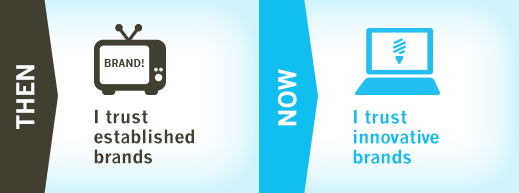Today, digital brands seem to come out of nowhere and quickly gain traction, even cult-like devotion. They’re not on TV, they don’t follow the rules, they may not even be regulated – but somehow we trust them. Why?

Trust is an evolving concept.
Once, we relied primarily on a community of people we trusted (“Hi neighbor, who should I use for my mortgage? And what do you recommend for this cough?”). As the world got bigger and our choices multiplied, we shifted our trust to big brands. They’re on TV, we reasoned, so they must be reputable.
Now, we’re putting our faith in digital companies whose connected services can simplify our lives. This trend is being accelerated by tech-savvy millennials – 74% of whom trust brands to protect their privacy online.1

Today the experience drives the sale.
It’s telling that Amazon, which was built on user experience, is usually tops in company reputation.2 Zappos (tagline: Powered by Service®) also knows that the experience is everything.
Today’s digital upstarts are running with that ball and gaining instant brand credibility by providing a superior online/mobile experience. They deliver it in many ways. Check out:
- Warby Parker’s beautifully simple, flawlessly functional UX
- Uber’s use of driver ratings to gain the confidence of passengers
- Oscar’s telemedicine – a new, simpler means of interaction
- LiquidSpace’s convenient, flexible service
- Via’s new cost-sharing transportation model

Talk to me, not at me.
Marketers used to mold customer perceptions. They controlled the conversation, if you could even call it that. In contrast, the new movers and shakers have a more egalitarian attitude – “we’re your friend” – that encourages interaction, kinship and community.
They may barely even advertise. What they do instead is try to humanize the experience and invite dialogue – both online and in the real world.

The rise of the self-reliant customer.
For many transactions, consumers are no longer looking to be led by the hand. They’ve got an arsenal of info, an online community that’s got their back, and that’s enough, thank you very much. In fact, 70% of advice-seekers refer to online reviews. Among millennial shoppers, 72% are influenced by their friends on social media.3
Knowing this, smart brands are providing “social proof” to build trust. Airbnb, for example, uses Facebook to overcome uncertainty. By showing a user how many connections she has in common with a host, or which friends have stayed at a property, she gains an instant level of comfort.

Don’t forget the face of your company.
In a marketplace business model, it’s easy to give short shrift to your sellers while rewarding buyers with loyalty programs and the like. After all, your sellers may not even be employees. They do, however, deliver the brand experience. To ensure it’s one people will trust, savvy companies are providing a playbook on superior service, conferring elite status on top performers, and fostering a community among sellers to help good ideas spread.
Trust still has to be earned.
While it may seem like some of today’s new brands get a free pass when it comes to trust, they’re working hard to gain and retain customer loyalty. For ideas on how your brand can do the same, let’s talk.
1 Digital Dopamine: 2015 Global Digital Marketing Report from Razorfish
2 2015 Harris Poll RQ® Summary Report
3 Mintel, American Lifestyles 2015 Report


 See what they have to say
See what they have to say